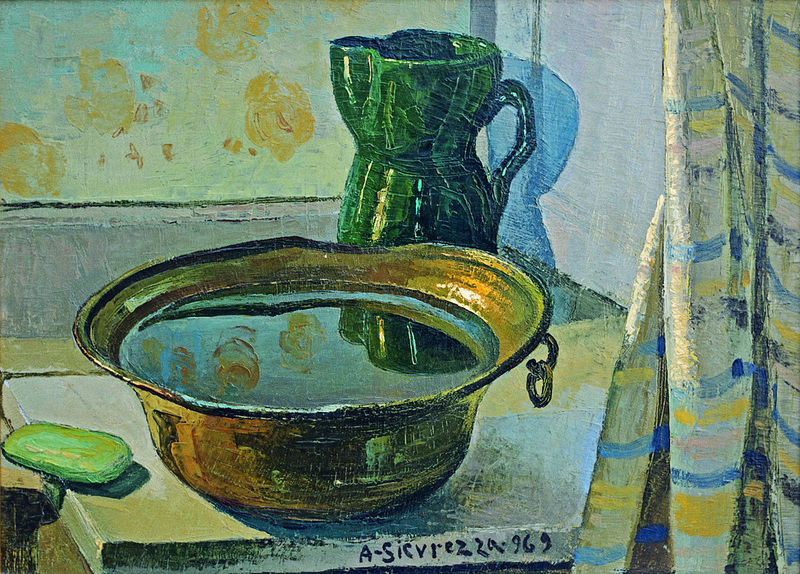Reflexive Verbs – Part 2 Posted by Geoff on Sep 7, 2018 in Grammar
In part 1, we looked at how reflexive verbs are formed and how we conjugate them in the present tense. Let’s take things to the next level.
We’ll work with the important reflexive verb ricordarsi = to remember. Let’s revise the present tense conjugations:
io mi ricordo = I remember
tu ti ricordi = you (singular, informal) remember
lui/lei si ricorda = he/she remembers
noi ci ricordiamo = we remember
voi vi ricordate = you (plural) remember
loro si ricordano = they remember
Examples:
mi ricordo che da piccolo avevo paura dei tuoni = I remember that when I was little I was afraid of the thunder
salve, ti ricordi di me? ci siamo conosciuti l’anno scorso = hello, do you remember me? we met last year
Now we’ll move into the passato prossimo (present perfect). The good thing about reflexive verbs is that they always conjugate in the past tense using essere (to be), and the past participle of the reflexive verb in question. As we are using essere, we need to ensure that the past participle agrees in gender and number with the subject:
io mi sono ricordato/a = I remembered
tu ti sei ricordato/a = you (singular, informal) remembered
lui/lei si è ricordato/a = he/she remembered
noi ci siamo ricordati/e = we remembered
voi vi siete ricordati/e = you (plural) remembered
loro si sono ricordati/e = they remembered
Examples:
Serena, ti sei ricordata di spegnere la luce? = Serena, did you remember to turn the light off?
che bello che si sono ricordati del nostro anniversario! = it’s really nice that they remembered our anniversary
mannaggia, non mi sono ricordato di chiudere quella finestra! = blast, I didn’t remember to close that window!
Remember: ricordarsi is always followed by the preposition di (which in this case = to)
Let’s try moving another useful reflexive verb into the passato prossimo (present perfect)
lavarsi = to wash oneself:
Federico, ti sei lavato le mani? = Federico, have you washed your hands?
Luisa si è lavata i capelli prima di uscire = Luisa washed her hair before going out
L’imperativo. When we give an order we use the imperative form. To construct the imperative with reflexive verbs we attach the reflexive pronoun to the end of the verb:
lavati le mani! = wash your hands!
laviamoci = let’s wash ourselves
lavatevi = wash yourselves
The same applies when we use the infinitive of a reflexive verb:
dovreste lavarvi = you should wash yourselves
ora non c’è tempo per lavarti i capelli = there’s no time to wash your hair now
N.B. some verbs change their meaning when used in the reflexive form:
trovare = to find, e.g. ho trovato le chiavi! = I’ve found the keys!
versus
trovarsi = to be, to find oneself=, e.g. qui mi trovo bene = I like being here/I feel good here, literally: I find myself well here
vedere = to see, e.g.: vedo che ti sei tagliata i capelli = I see that you’ve cut your hair
versus
vedersi = to see each other, e.g.: ci vediamo alle nove allora = we’ll see each other at nine then (see you at nine then)
Arrivederci! = until we see each other again!

Build vocabulary, practice pronunciation, and more with Transparent Language Online. Available anytime, anywhere, on any device.





Comments:
Gianna Shaw:
Geoff
La sua spiegazione dei verbi riflessi e stato veramente utile – complimenti!
Geoff:
@Gianna Shaw Grazie Gianna, ne sono molto contento! 🙂
Giacomo Herbert:
I love your blog and we always read it to learn and keep in practice. Now we are going to Rapallo for some time and are really cramming. Which brings me to my confusion: just when do you use ricordarsi vs. ricordare? Perhaps an explanation of this would also help others. Thanks and keep up the great work!
Chris:
Hello, many thanks for the clear explanation of reflexive verbs. Could you tell me please if all reflexive verbs have non-reflexive form or are some only ever reflexive?
Grazie.
Serena:
@Chris Salve Chris!
Most reflexive verbs also have a non-reflexive form. However there are some which are only used in the reflexive form, e.g. accovacciarsi (to squat), ostinarsi (to persist), pentirsi (to repent).
Saluti da Serena
Nini Rukmini:
grazie mille Geoff.